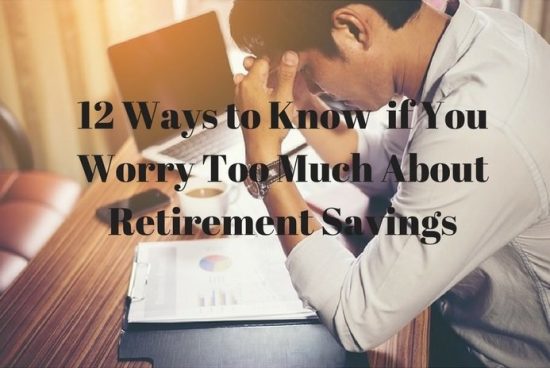 Saving too much money can be a bad thing. Doing anything to the extreme always has unexpected or even expected consequences that can have lasting adverse effects. f you are a natural saver like myself, then you know exactly what I am talking about. Just like wracking up debt over time can create severe financial and emotional stress, saving too much too quickly requires a great deal of sacrifice and, if not done correctly, can cause other problems and priorities. For the average American, retirement savings are a massive cause of anxiety – here’s a list of things to keep in mind whether you’ve started saving for retirement at 30 or worrying about how to save for retirement in your 50s.
Saving too much money can be a bad thing. Doing anything to the extreme always has unexpected or even expected consequences that can have lasting adverse effects. f you are a natural saver like myself, then you know exactly what I am talking about. Just like wracking up debt over time can create severe financial and emotional stress, saving too much too quickly requires a great deal of sacrifice and, if not done correctly, can cause other problems and priorities. For the average American, retirement savings are a massive cause of anxiety – here’s a list of things to keep in mind whether you’ve started saving for retirement at 30 or worrying about how to save for retirement in your 50s.
Table of Contents
Can You Over-Save for Your Retirement?
One of the ways I keep myself in check from over saving is by compromising with my husband. Although we are both savers, my husband tends to gravitate more toward a balance of saving and spending money. Like with any relationship, he keeps me in check when I go crazy with our savings rate. A first, it was a difficult adjustment to make. However, I found that spending a little more on the new had benefits that I also enjoyed, especially since we typically agree on what to spend our money on. F r example, in 2017, we decided to loosen our savings rate from 30% to 25% of our take-home pay (we also contribute to our respective employer’s retirement matching program but don’t include that in our rate calculation), so we can take more vacations. W aim to take four breaks this year, three outside the continent. So far, we have one breakdown and three more to go. He and I can enjoy money this way with no regrets.
If you think you might be over saving or worrying too much about your retirement plans, here are a few ways to find out:
Living Paycheck to Paycheck with Double-Digit Retirement Savings
If you are saving more than your household income can afford, that may signal a few things. It might mean you must cancel a few subscriptions, sell a vehicle or downsize certain areas of your life. It might also mean you need to re-evaluate the amount of money you’re putting toward your retirement each month. Sometimes we may want to ‘run before we walk or jog before we stretch,’ but like physical exercise, this can leave us tired and burned out very quickly. Instead of rushing to save more by cutting back expenses, scale back your savings rate and strive to increase your income instead. Then be mindful of lifestyle inflation as your income increases. Increasing your payment can still achieve your retirement savings goal over time without sacrificing as much now.
Delaying What You Need to Save More Money For Retirement

Do you need to update your wardrobe for work but are putting it off so you can save more money? Are there home repairs you are putting off for so long that they will cost you more to fix once you get to them? Do y generally get annoyed when you must spend money on anything in the home? Having a pleasant and inviting place to come home to is good for the mind and can affect your overall long-term mood. Also, buying clothes that make you look and feel good boosts morale and confidence. Be sure e to find a balance between saving for retirement and spending money on things you need now.
Avoiding Social Activities to Avoid Spending Money
A part of socializing and building lasting relationships requires spending money. Of course, the occasional potluck is a huge money saver, but some experiences need engaging in more expensive activities. Do you find yourself disengaging with your friends whenever the topic of doing something together that costs money comes up? Do you hang out with your friends less, or have they complained that you don’t do anything with them anymore? Spending money whenever your friends have an activity in mind that is unsuitable for your budget. However, r, shying away from spending money on activities may cost you lasting friendships over time, which are relationships you’ll want when you retire. Unlike a short-term goal like paying off debt or saving for an emergency fund, saving for retirement can take decades, if not longer, to achieve. As we get older, it is important to treasure the friends we do have because it gets harder to make new lasting relationships as we age. If you do e in moderation, spending money on activities with friends is a significant investment.
How Will A Government Pension Plan Affect Your Retirement Savings
Government pension plans are not meant to cover all the expenses incurred during retirement. Instead d, they should serve as one source of retirement income in your portfolio. As mu h as it is not good to overestimate how much you may receive from a government pension (use average statistical values when retirement planning, not maximums). On the other hand, it may also be unwise to underestimate. If you are a decade or less to retirement age, you should research and find how much you may expect to receive from government pensions, as that will impact your retirement saving plans.
You rely entirely on saving and not investing your money.

Gone are the days when you could put your money in a Certificate of Deposit (CD) or Guaranteed Investment Certificate (GIC) and expect a 4% to 5% return on your savings. If you are not investing your money long-term, you will always find that you are not saving for retirement as robustly as possible. Maybe not right away, but over time, you will find that you can’t save enough to cover the expenses you will incur when you retire. This s because the cost of living typically increases yearly due to inflation. Each year, the rage inflation rate is around 1.5%- 2%. So, if you put your long-term money in anything that is not getting you at least a 2% return on your investment each year (after taxes & fees), you will have less money in the future than when you started. To compensate for this loss, you will need to save more now to have the same purchasing power when you retire as someone who saved less but invested their money. Therefore, learning to invest your money is an investment in your present and future financial well-being. You can always start by micro-investing.
Meanwhile, if you are considering investing in some specific index funds, consider those designed to provide opportunities for market-linked growth without exposing your principal to direct market risks. This way, if your chosen index performs well, you earn a fraction of the positive returns. In the case where it performs poorly, your principal is generally protected. You may read more on index annuity rates to learn how they can impact your retirement and savings and make an informed decision.
You visit your budget daily, trying to find ways to trim expenses so you can save more.
I have been guilty of this one in the past. Although h my husband and I decide on the family budget a year in advance, I typically make the week-to-week bill payments and tweak numbers to make it all work. In the recent past, I found myself obsessed with how much we were putting towards retirement each paycheck and obsessing over ways to cut back even more. Most o the time, the changes were minuscule because our budget was solid, but for some reason, I felt like if I just looked at it one more time, I could find “extra” money that I missed. Of course, there s nothing wrong with tweaking your budget, but moderation is key.
You insist on staycations each year to avoid spending money.
Staycations can be significant and relaxing. However, every once in a while, it is nice to venture out of the city, country, or continent and explore other cultures, experience new things and gain a different perspective. Vacation ns (not financed with debt) is a great way to unwind and distress, allowing you to return to work more productively than before. They can o offer great memories and experiences for a lifetime.
You have a defined benefits plan, or your employer contributes substantially to your pension.
 If you are a government employee or work for one of the less than 20% of employers that still offer a defined benefits plan AND you also save for retirement, you may be over saving. Government employees and defined benefits recipients are typically guaranteed a fixed retirement income for the rest of their life regardless of how the markets perform. Of cour e, the amount paid out each month depends on years of service and salary while employed, but having that assurance takes a lot of the financial pressure out of retirement planning. If unusual e, discuss with human resources what type of retirement package(s) your employer offers and how contributing outside these plans may affect your contribution limits and taxes.
If you are a government employee or work for one of the less than 20% of employers that still offer a defined benefits plan AND you also save for retirement, you may be over saving. Government employees and defined benefits recipients are typically guaranteed a fixed retirement income for the rest of their life regardless of how the markets perform. Of cour e, the amount paid out each month depends on years of service and salary while employed, but having that assurance takes a lot of the financial pressure out of retirement planning. If unusual e, discuss with human resources what type of retirement package(s) your employer offers and how contributing outside these plans may affect your contribution limits and taxes.
You have a sizable debt load but refuse to allocate more than the minimum payments toward your debt so you can save more money.
Focusing entirely on saving money without factoring in debt is looking at one side of the equation only. Suppose you have a sizable amount of consumer debt (i.e., student loans, credit cards, car loans, personal loans, lines of credit, etc.) and don’t want to stop saving so you can pay off the debt In that case; it is still essential to make sizable payments so you can minimize your monthly interest costs Over ti e, high-interest charges eat away at your wealth, especially those incurred on consumer debt So be sure to address your debt before deciding to start saving money aggressively.
You compromise too much time away from your family and friends to make more money so you can save it.

Working multiple jobs to increase your income and spending long hours at work or home to make more money can be a great short-term strategy to boost savings or get out of a financial hole if everyone affected by this decision is on board. The pro LEM arises when this becomes a new way of life, and there is no end. Money c n be replaced, but the time lost from not being with family and friends is gone forever. Another way of looking at it may be assessing what matters to you when you are on your deathbed, the people visiting you at the hospital, or your investments. For most people, it’s the former because we can’t take our money with us. It has n value to us when we are dead. Be sure o allocate time for the people closest to you.
You like having an ambitious retirement nest egg and striving to reach that goal, but you can’t explain what you will use that money for when you retire.
Having $5 or 10 million dollars saved by retirement sounds nice, right But as you’re looking at how to save for retirement, have you ever asked yourself what you would do with all that money If you h ve? You have concrete answers to this question, and that is great. You are all on your way. Many people e, however, like the idea of retiring with 10 million dollars but don’t have a strategic plan for spending all that money. Evaluate the reasoning behind the dollar amount you chose for your retirement goal. Are the r sons in line with your values? Are you willing to make the sacrifices necessary to reach the goal? If so, what cost, and can you live with the consequences that $5 or $10 million may not be enough for one (or two) people to retire with? Instead, it is the why behind the necessary amount.
 You are afraid of any uncertainty (primarily financial) and hedge your risk by saving even more money for your retirement.
You are afraid of any uncertainty (primarily financial) and hedge your risk by saving even more money for your retirement.
Some people are more risk-averse than others, but there is only so much we can plan for. The rest w need to let be. Do you still l feel insufficient or have double what you need for your emergency fund? Even after carefully reviewing the numbers with your financial planner/accountant, do you still worry that you aren’t saving enough for retirement? Do you care the funds for every expected or unexpected expense? Having an emergency fund and various savings accounts for oversized ticket items is prudent, but planning and over-saving in anticipation of the worst can be a distraction. Have an em emergency fund in place, regularly recommit to retirement savings, stay within your budget and learn to live comfortably with uncertainty?
Retirement can be a subject that causes us some stress and worry. You might wonder how to afford assisted living or if you’ve been paying enough into your pension plan. It’s natural l to worry about these things, but the key is to get organized. You might consider working with a financial advisor to help you plan for your future and retirement. With expert support, you can make the best decisions for your future. You can get advice, from investing wisely to choosing the correct retirement account.
 You are afraid of any uncertainty (primarily financial) and hedge your risk by saving even more money for your retirement.
You are afraid of any uncertainty (primarily financial) and hedge your risk by saving even more money for your retirement.